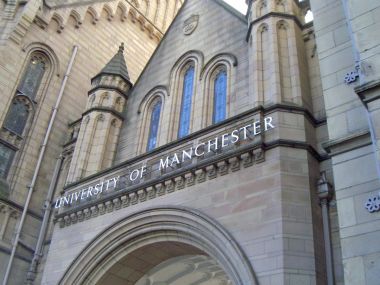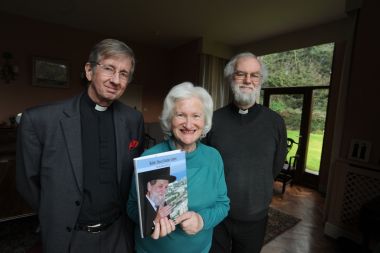Manchester University says it is 'likely' to re-catalogue Holocaust denier's books following campaign

Manchester University has said that it is 'likely' to re-catalogue books by the Holocaust denier David Irving following a campaign led by the former Archbishop of Canterbury, Rowan Williams, and an eminent Jewish academic, Irene Lancaster.
Williams last week wrote a powerful letter to the university's Vice Chancellor over the institution's ongoing refusal to remove unmarked books by Irving from open display in its main library.
He said the issue needs 'urgent attention' and warned that the current arrangement of Irving's work 'could be experienced as threatening by Jewish members of the University'.
In response, the university issued a statement defending its position and saying the books will remain on display, but added: 'We are investigating ways to re-catalogue the books.'
Now Lancaster, who was Manchester University's first Teaching Fellow in Jewish history, has received an email from Prof James Thompson, the university's Vice President for Social Responsibility, following a meeting with him, Lancaster's colleague Dr Gillian Moss and the university's head of diversity and equalities, Patrick Johnson.
In the email, seen by Christian Today, Thompson writes: 'There are ongoing discussions as to the best exact classification of the books and this is likely to lead to them being re-catalogued.'
He says: 'Many thanks for the meeting you held with Patrick and me on 4th April. We both felt it was very constructive and cordial, and we valued the opportunity to explain our commitment to the University as a welcoming and diverse community.
'At that meeting, I committed to asking my colleagues in the Centre for Jewish Studies and the University Librarian whether there was justification in changing our current approach to the David Irving books.
'Following this, we have reviewed our current approach and have also checked with other university libraries what their approach is on this matter. We have had responses from over 20 university libraries to date. The evidence is that our approach to the David Irving books is consistent with theirs and we are all confident that such approach remains correct. There are ongoing discussions as to the best exact classification of the books and this is likely to lead to them being re-catalogued.'
A number of universities do not feature Irving's books on open display however, including the neighbouring Manchester Metropolitan University.
In its statement in response to the letter by Williams to Dame Nancy Rothwell, Manchester University's President and Vice Chancellor, last week, the university said: 'In reaching the decision to keep these books on display, The University of Manchester has consulted both within our own Centre for Jewish Studies, and with the majority of the UK's research libraries: many of which also adopt the same approach. We are investigating ways to re-catalogue the books but they will remain available to staff and students who have access to our library service.
'The University is committed to allowing our students to have access to challenging and controversial works on many different subjects in order to pursue their studies. This is in line with the established International Federation of Library Associations and Institutions' Statement on Libraries and Intellectual Freedom.
'This approach in no way compromises the University's fundamental rejection of discrimination which is at the heart of how we seek to educate students and pursue our research activities.'

Canon Guy Wilkinson CBE, the distinguished former inter-religious affairs adviser to the Church of England, said: 'The...statement issued by Manchester University...misses the core point being made. The issue is not at all about "allowing our students to have access to challenging and controversial works" – of course they should. It is about the terms under which students have access and about the ways in which real history is distinguished from "fake" history.
'I am surprised that the University seems willing to risk damage to their reputation in being praised by such as David Irving rather than make a sensible adjustment to meet a point which is clear to everyone – that real history should be distinguished clearly from propaganda.'
Irving has praised Manchester University's 'suitably frosty reply' to Lancaster, whom he repeatedly described on his website as 'the Jewess'.
The intervention by Dr Williams came amid a growing row over the unmarked presence of Irving material in Manchester University's John Rylands library, and a wider argument about antisemitism at British universities.
In February, Christian Today revealed that Churchill College, Cambridge removed Irving's books from 'open access' after a complaint from Lancaster.
Lancaster has repeatedly requested in recent weeks that the university follows suit, as has the Labour MP for Blackley and Broughton, Graham Stringer, who has also written to Dame Nancy.
Christian Today has learned that Lancaster has the sympathy of Greater Manchester's Lord Lieutenant, Warren Smith, over the matter.
Williams, who is Master of Magdalene College, Cambridge, wrote to Dame Nancy: 'I ... have concerns over the shelving of works like those of Irving alongside routine historical texts. Given that his work has been declared by experts like my colleague Sir Richard Evans to be undeserving of the name of history and to be characterised by deliberate falsification of material, it is not a question of alternative interpretations of history or of expressions of simple opinion, but of a very specific genre of literature, quite distinct from history.
'Of course students should be allowed to read it for approved academic purposes, but there is, it seems to me, a strong case for shelving or labelling it independently to clarify its nature. And not doing so could be open to the challenge that its presence without such clarification could be experienced as threatening by Jewish members of the University, in the sense spelled out in official definitions of anti-semitism and listed on the website, "The Law of Anti-Semitism".
'At a time when there is, nationally and internationally, a measureable rise in the expression of extremist views I believe that this question needs urgent attention.'
Lancaster, who has engaged in extensive research on the Holocaust and has worked with the Yad Vashem Holocaust memorial centre in Jerusalem, has pointed out to the university that 'Irving is seductive to students and immature minds'. Lancaster's grandmother was murdered at Treblinka.
In March, Williams also wrote to Jo Johnson, the higher education minister, expressing concern about the presence of Holocaust-denying material on open display at university libraries.
In his letter, Williams suggested that the government should hold a position on the subject, and pointed to the 'Prevent' legislation as being a possible tool for tackling the issue.
Williams said that Holocaust-denying material should be labelled and available on request and not indiscriminately, and compared it to jihadi material.











